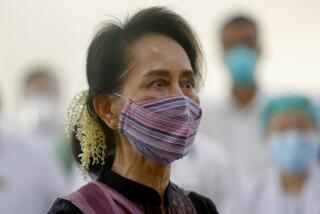A Message to Myanmar
- Share via
Myanmar’s ruling military dictatorship casts a long, ugly shadow on Southeast Asia at a time when the seven members of the Assn. of Southeast Asian Nations (ASEAN) are considering admitting their neighbor, once known as Burma, to the regional trade and political group.
Since May, Myanmar’s ruling State Law and Order Restoration Council (SLORC) has renewed its crackdown on the democracy movement led by Aung San Suu Kyi, winner of the 1991 Nobel Peace Prize and the daughter of a Burmese patriot.
The stepped-up repression, along with a refusal to provide information on the suspicious prison death of a man who was honorary consul general for several European countries, has prompted two breweries, Heineken of the Netherlands and Carlsberg of Denmark, some other foreign companies and a Danish pension fund to withdraw from investments or operations in Myanmar. The American company Pepsico pulled out earlier this year, selling its stake in a cola bottling franchise.
Some foreign political groups and Suu Kyi, meanwhile, are calling for international economic sanctions against the military unless it recognizes her National League of Democracy, which won legislative elections in 1990 but was denied a chance to rule by the military. So far, the European Union and the United States have not pressed for economic sanctions against military rule, in part because of the opposition in Asia to this course. But U.S. Secretary of State Warren Christopher is likely to raise general concerns about the situation when he attends the ASEAN Regional Forum meeting in Jakarta on Monday. Separately, Sen. Mitch McConnell (R-Ky.) is leading an effort to ban U.S. private investment in Myanmar.
Officially ASEAN follows a policy of non-interference and constructive engagement. The group is to grant Myanmar observer status, a precursor to full membership, at this weekend’s meeting of ASEAN foreign ministers. SLORC understands that Myanmar’s future depends on economic development and that the best way to achieve this, especially now that the nation has suffered its second sizable currency depreciation in as many months, is through cooperation with its Asian neighbors. Conversely, for ASEAN to engage Myanmar constructively it must convince the generals to unbind the democracy movement and create a constitution that gives primacy to civilian rule. Some ASEAN members have experienced military rule and eventually succeeded in making a transition to democracy.
Unless and until the military yields, Myanmar is not likely to receive support from the United States and European countries for the World Bank and IMF financing that the country desperately needs for development. Nor should it. There is a way out, and the generals know it. They need the courage to take the right step.
More to Read
Sign up for Essential California
The most important California stories and recommendations in your inbox every morning.
You may occasionally receive promotional content from the Los Angeles Times.













